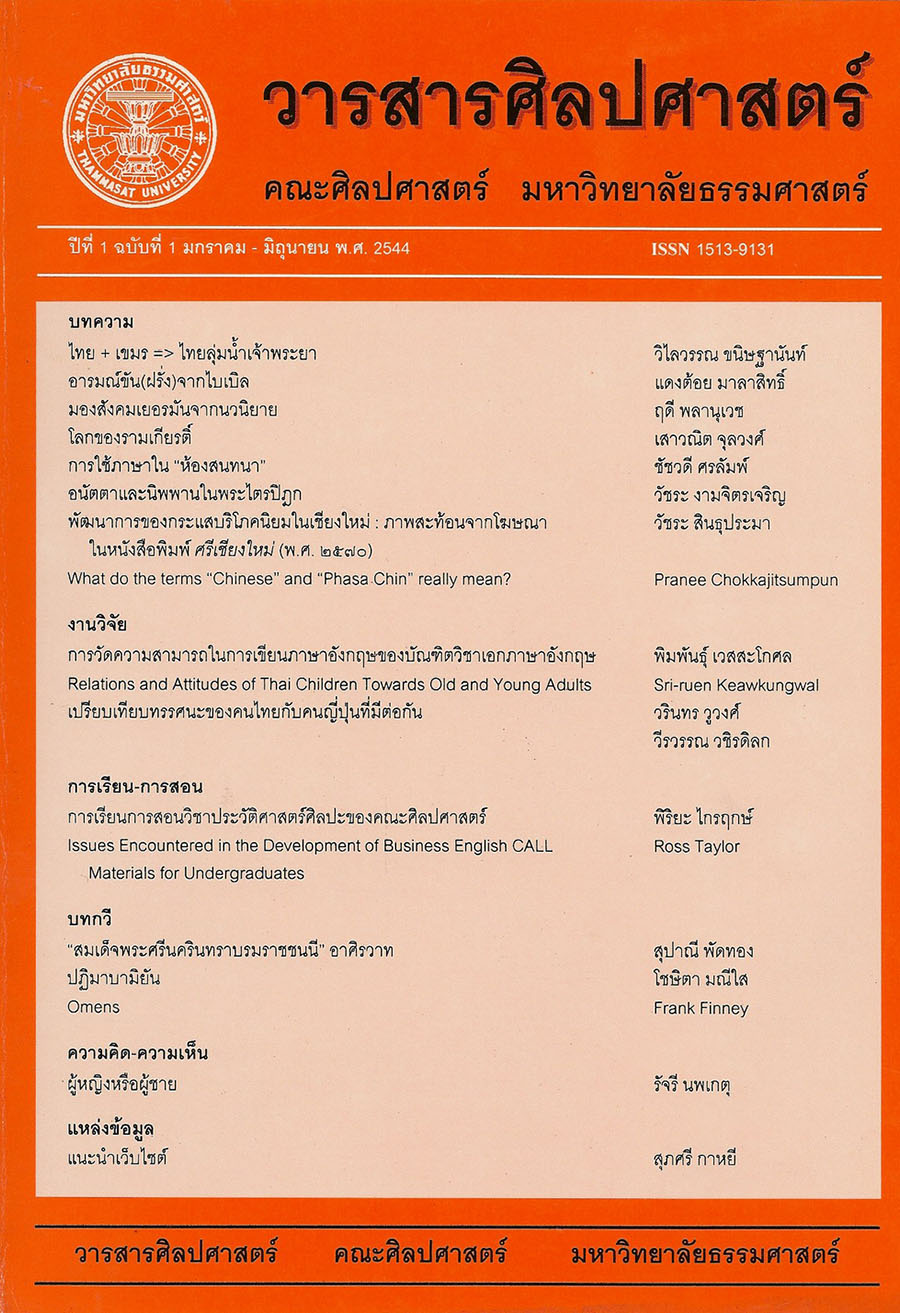เปรียบเทียบทรรศนะของคนไทยกับของคนญึ่ปุ่นที่มีต่อกัน
Main Article Content
บทคัดย่อ
งานวิจัยเรื่อง “เปรียบเทียบทรรศนะของคนไทยกับของคนญี่ปุ่นที่มีต่อกัน” นี้มีวัตถุประสงค์เพื่อศึกษาเปรียบเทียบลักษณะเด่นของคนไทยและคนญี่ปุ่นใน 6 ด้าน คือ ทรรศนะต่อการทำงาน การอยู่ร่วมกัน ความรู้ เพศ ชีวิต และสถาบัน ตลอดจนความคาดหวังของคนไทยและคนญี่ปุ่นที่มีต่อกันโดยรวบรวมข้อมูลจากแบบสอบถามของกลุ่มตัวอย่างคนไทยและคนญี่ปุ่น ซึ่งอาศัยอยู่และทำงานในเขตกรุงเทพมหานครและปริมณฑล
ผลปรากฏว่ามีผู้กรอกแบบสอบถามกลับมาเป็นคนไทย 600 คน และคนญี่ปุ่น 504 คน จากผลการวิจัยข้อมูลทางสถิติทำให้ทราบว่า
คนญี่ปุ่นเป็นชนชาติที่มีลักษณะเด่นเฉพาะตัวมากกว่าคนไทยอย่างน่าสนใจ
ทั้งคนไทยและคนญี่ปุ่นมีความคิดเห็นที่แตกต่างกันในทรรศนะทั้ง 6 ด้าน
นอกจากนี้ จากการประมวลความคิดเห็นของผู้ตอบแบบสอบถามพบว่าคนญี่ปุ่นคาดหวังคนไทยในเรื่องการเข้มงวดต่อตนเอง ในขณะที่คนไทยคาดหวังคนญี่ปุ่นในเรื่องความเป็นกันเอง ในตอนท้ายของงานวิจัย ผู้วิจัยได้สรุปไว้ว่า
ความคาดหวังว่าวัฒนธรรมจะเปลี่ยนแปลงได้ในเวลาอันสั้นนั้น เป็นเรื่องที่เป็นไปได้ยากเนื่องจากการเปลี่ยนแปลงทางวัฒนธรรมต้องใช้เวลายาวนาน แต่พฤติกรรมหลายอย่างสามารถปรับเปลี่ยนได้
แต่ละฝ่ายไม่ควรนำมาตรฐานของคนเองมาครอบงำอีกฝ่ายหนึ่ง หรือกล่าวอีกนัยหนึ่งคนทั้งสองชาติต้องลืมความเป็นคนในชนชาตินั้นๆ ลงบ้าง จึงจะช่วยลดอุปสรรคในการคบหา และทำงานร่วมกันกับอีกฝ่ายหนึ่งให้น้อยลงได้
The research “Comparison of Thai and Japanese Viewpoints Towards Each Other” aims to comparatively study the unique characteristics of the Thai and Japanese peoples within their own and from the other’s viewpoints; their commonsense views from the 6 aspects: work, collectiveness, knowledge, sex, life, and institution; and expectations towards each other. Questionnaires were distributed to a sample of Thai and Japanese people who lived and worked in Bangkok and its surrounding provinces. 600 Thai and 504 Japanese returned the questionnaires.
Based on statistic analysis of the data obtained, it has been found out that:
1. It is interesting that Japanese people possess more individual unique characteristics than Thai people
2. Thai and Japanese peoples have different viewpoints with respect to the 6 aspects.
In addition, summarizing the opinions of those who answered the questionnaires reveals that Japanese people expect Thai people to be more self-disciplined while Thai people expect Japanese people to be more friendly. It is concluded that:
1. Expectations regarding cultural changes might not be materialized in short time but many behavior changes would be achievable,
2. One should not impose one’s own standard or viewpoint on the other. In other words, in order to reduce obstacles in their inter-relationships and work, both peoples have to sometimes forget their own national identity.


